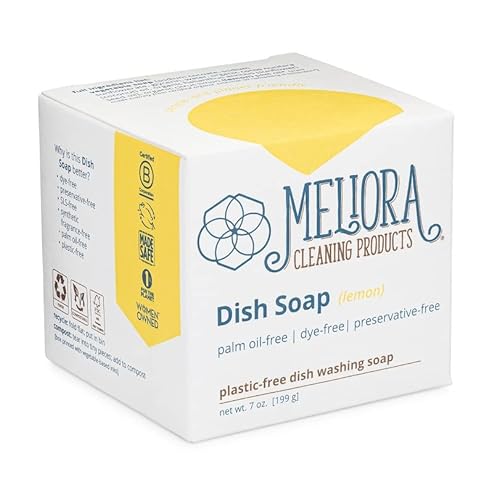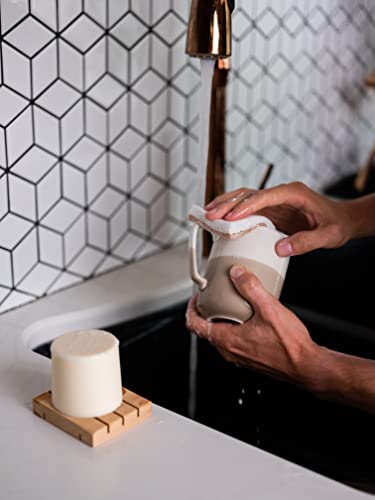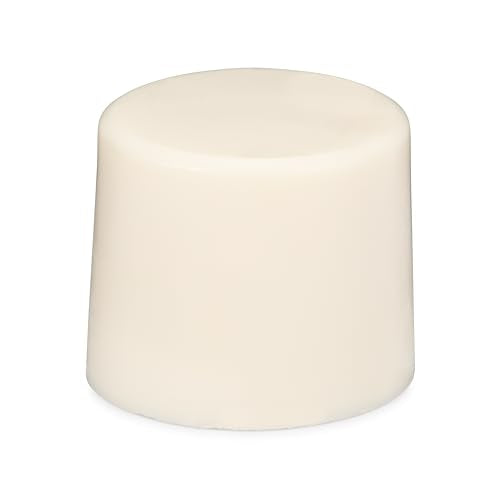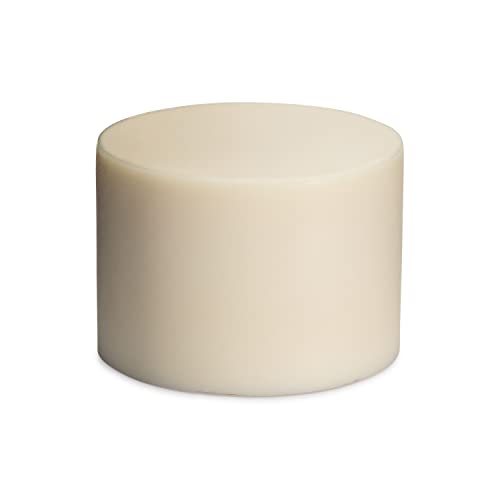



Meliora Cleaning Products Dish Soap Bar - Effective Stain Removal, Organic Lemon Scent - 4oz


Sodium Cocoate
Low RiskSodium cocoate is the sodium salt of fatty acids derived from coconut oil. It is primarily used in cosmetic formulations as a surfactant and cleansing agent, effectively helping to emulsify oils and fats, contributing to the overall texture and performance of the product.
Sustai Insights
Sodium cocoate acts as an effective surfactant and cleansing agent, offering functional benefits in personal care products. It is biodegradable and derived from renewable sources, contributing to sustainability. Health risks are low, as it is not associated with carcinogenicity, significant allergenic potential, or reproductive toxicity. However, it may cause mild irritation to skin, eyes, or lungs. Regulatory bodies have not imposed significant restrictions, affirming its safety for use. Overall, it presents a low-risk profile, making it a suitable choice in formulations.
Citrus Limon (Lemon) Peel
Low RiskCitrus limon (lemon) peel is derived from the outer skin of lemons and is commonly used in cosmetic formulations for its aromatic properties and potential skin benefits. It serves primarily as a fragrance agent and may also provide antioxidant effects.
Sustai Insights
Citrus limon (lemon) peel is valued for its aromatic contributions and potential antioxidant properties, which can enhance product appeal. It has a low risk of adverse health effects, including low concerns for carcinogenicity, allergies, and irritation. Environmental risks are minimal, with no significant evidence of bioaccumulation or pollution. Regulatory assessments indicate no restrictions on use. Overall, it is considered low risk, and safe usage practices should be maintained. Alternatives may include other citrus peels or natural fragrance compounds.
Cocos Nucifera (Coconut) Oil
Low RiskCocos Nucifera (Coconut) Oil is derived from the kernels of the coconut palm. It is primarily used in cosmetic formulations for its emollient and moisturizing properties, making it suitable for skin and hair care products.
Sustai Insights
Coconut oil serves as an effective moisturizer and emollient, promoting skin hydration and softness. It is sustainably sourced and biodegradable. Health risks are minimal, with low concerns regarding carcinogenicity, allergens, and reproductive toxicity. Environmental impact is also low, as it does not contribute significantly to pollution or bioaccumulation. Regulatory bodies have not issued restrictions on its use. Overall, coconut oil presents a low risk for health and environmental concerns, making it a safe ingredient in cosmetic products.
Sodium Sunflowerate
Low RiskSodium sunflowerate is a sodium salt derived from sunflower oil, primarily used as an emulsifier and surfactant in various cosmetic and personal care products. It aids in stabilizing formulations by enhancing the mixing of oil and water components.
Sustai Insights
Sodium sunflowerate serves as an effective emulsifier, offering functional benefits in product formulation. It is considered low-risk regarding health concerns such as carcinogenicity, allergies, and reproductive toxicity. Environmentally, it poses minimal risks, with no significant pollutant potential or bioaccumulation noted. Regulatory agencies have not issued any restrictions. Overall, its risk level is low, making it a suitable ingredient in cosmetic products. Safe usage practices should be followed, and alternatives such as other plant-derived emulsifiers could be considered.
Vegetarian Glycerin
Low RiskVegetarian glycerin, also known as glycerol, is a colorless, odorless, and viscous liquid derived from plant sources. It is primarily used as a humectant, solvent, and emollient in various personal care products, helping to retain moisture and improve texture.
Sustai Insights
Vegetarian glycerin offers functional benefits as an effective humectant, promoting hydration and skin smoothness. It is biodegradable and typically sustainably sourced. Health risks associated with glycerin are low, with no significant concerns for carcinogenicity, allergens, or reproductive toxicity. Environmental risks are minimal, and it is not subject to major regulatory warnings. Overall, the risk level for this ingredient is low, making it a safe choice in formulations. Safe usage practices include ensuring proper concentrations in products, and alternatives such as propylene glycol exist but may have differing properties.
Helianthus Annuus (Sunflower) Seed
Low RiskHelianthus annuus (sunflower) seed is derived from the seeds of the sunflower plant and is commonly used in various cosmetic and personal care products. It serves primarily as an emollient and skin conditioning agent, providing moisture and enhancing the texture of formulations.
Sustai Insights
Helianthus annuus (sunflower) seed offers functional benefits, including skin conditioning and moisturizing properties, while being sustainably sourced and biodegradable. Health risks are minimal, with low concerns for carcinogenicity, allergies, and reproductive toxicity. Environmentally, it presents low risks of pollution or bioaccumulation. Regulatory assessments indicate no current restrictions. Overall, it is considered a low-risk ingredient, and safe usage practices should be maintained. Alternative ingredients may include other plant-based oils, but the sunflower seed oil remains a viable option.
Sodium Cocoate
Low RiskSodium cocoate is the sodium salt of fatty acids derived from coconut oil. It is primarily used in cosmetic formulations as a surfactant and cleansing agent, effectively helping to emulsify oils and fats, contributing to the overall texture and performance of the product.
Sustai Insights
Sodium cocoate acts as an effective surfactant and cleansing agent, offering functional benefits in personal care products. It is biodegradable and derived from renewable sources, contributing to sustainability. Health risks are low, as it is not associated with carcinogenicity, significant allergenic potential, or reproductive toxicity. However, it may cause mild irritation to skin, eyes, or lungs. Regulatory bodies have not imposed significant restrictions, affirming its safety for use. Overall, it presents a low-risk profile, making it a suitable choice in formulations.
Citrus Limon (Lemon) Peel
Low RiskCitrus limon (lemon) peel is derived from the outer skin of lemons and is commonly used in cosmetic formulations for its aromatic properties and potential skin benefits. It serves primarily as a fragrance agent and may also provide antioxidant effects.
Sustai Insights
Citrus limon (lemon) peel is valued for its aromatic contributions and potential antioxidant properties, which can enhance product appeal. It has a low risk of adverse health effects, including low concerns for carcinogenicity, allergies, and irritation. Environmental risks are minimal, with no significant evidence of bioaccumulation or pollution. Regulatory assessments indicate no restrictions on use. Overall, it is considered low risk, and safe usage practices should be maintained. Alternatives may include other citrus peels or natural fragrance compounds.
Cocos Nucifera (Coconut) Oil
Low RiskCocos Nucifera (Coconut) Oil is derived from the kernels of the coconut palm. It is primarily used in cosmetic formulations for its emollient and moisturizing properties, making it suitable for skin and hair care products.
Sustai Insights
Coconut oil serves as an effective moisturizer and emollient, promoting skin hydration and softness. It is sustainably sourced and biodegradable. Health risks are minimal, with low concerns regarding carcinogenicity, allergens, and reproductive toxicity. Environmental impact is also low, as it does not contribute significantly to pollution or bioaccumulation. Regulatory bodies have not issued restrictions on its use. Overall, coconut oil presents a low risk for health and environmental concerns, making it a safe ingredient in cosmetic products.
Sodium Sunflowerate
Low RiskSodium sunflowerate is a sodium salt derived from sunflower oil, primarily used as an emulsifier and surfactant in various cosmetic and personal care products. It aids in stabilizing formulations by enhancing the mixing of oil and water components.
Sustai Insights
Sodium sunflowerate serves as an effective emulsifier, offering functional benefits in product formulation. It is considered low-risk regarding health concerns such as carcinogenicity, allergies, and reproductive toxicity. Environmentally, it poses minimal risks, with no significant pollutant potential or bioaccumulation noted. Regulatory agencies have not issued any restrictions. Overall, its risk level is low, making it a suitable ingredient in cosmetic products. Safe usage practices should be followed, and alternatives such as other plant-derived emulsifiers could be considered.
Vegetarian Glycerin
Low RiskVegetarian glycerin, also known as glycerol, is a colorless, odorless, and viscous liquid derived from plant sources. It is primarily used as a humectant, solvent, and emollient in various personal care products, helping to retain moisture and improve texture.
Sustai Insights
Vegetarian glycerin offers functional benefits as an effective humectant, promoting hydration and skin smoothness. It is biodegradable and typically sustainably sourced. Health risks associated with glycerin are low, with no significant concerns for carcinogenicity, allergens, or reproductive toxicity. Environmental risks are minimal, and it is not subject to major regulatory warnings. Overall, the risk level for this ingredient is low, making it a safe choice in formulations. Safe usage practices include ensuring proper concentrations in products, and alternatives such as propylene glycol exist but may have differing properties.
Helianthus Annuus (Sunflower) Seed
Low RiskHelianthus annuus (sunflower) seed is derived from the seeds of the sunflower plant and is commonly used in various cosmetic and personal care products. It serves primarily as an emollient and skin conditioning agent, providing moisture and enhancing the texture of formulations.
Sustai Insights
Helianthus annuus (sunflower) seed offers functional benefits, including skin conditioning and moisturizing properties, while being sustainably sourced and biodegradable. Health risks are minimal, with low concerns for carcinogenicity, allergies, and reproductive toxicity. Environmentally, it presents low risks of pollution or bioaccumulation. Regulatory assessments indicate no current restrictions. Overall, it is considered a low-risk ingredient, and safe usage practices should be maintained. Alternative ingredients may include other plant-based oils, but the sunflower seed oil remains a viable option.
Experience the power of nature with Meliora Cleaning Products Dish Soap Bar in Lemon. This eco-friendly dish soap is not only effective at removing tough food stains and grease but also supports sustainable living. With its concentrated formula, this solid soap minimizes waste while keeping your dishes sparkling clean.
- Effective Cleaning: Easily eliminates food stains and grime from all dishware and cookware, making dishwashing a breeze.
- Eco-Conscious Design: Concentrated soap reduces plastic waste, packaged in recyclable and compostable materials.
- Safer Ingredients: Made from organic coconut and sunflower oils, with full ingredient transparency for peace of mind.
- Certified Sustainable: Proudly made in the USA by a woman-owned, B Corp Certified business committed to environmental causes.
- Pleasant Scent: Enjoy the refreshing aroma of organic lemon essential oil while you clean, enhancing your dishwashing experience.
Choose Meliora for a clean home and a healthier planet.
Subscribe & Save with Sustai
- Best Price Guarantee: Always enjoy the lowest prices on sustainable home essentials.
- No Surprises: We’ll notify you before shipping. No hidden fees, ever.
- You’re in Charge: Change, pause, or cancel your subscription anytime with ease.
- Eco-Friendly Deliveries: Our grouped shipments mean less packaging and lower emissions.
Join us on a sustainable journey. Special offers for a limited time! Prices and promotions may change.
Recommended Products
Experience the power of nature with Meliora Cleaning Products Dish Soap Bar in Lemon. This eco-friendly dish soap is not only effective at removing tough food stains and grease but also supports sustainable living. With its concentrated formula, this solid soap minimizes waste while keeping your dishes sparkling clean.
- Effective Cleaning: Easily eliminates food stains and grime from all dishware and cookware, making dishwashing a breeze.
- Eco-Conscious Design: Concentrated soap reduces plastic waste, packaged in recyclable and compostable materials.
- Safer Ingredients: Made from organic coconut and sunflower oils, with full ingredient transparency for peace of mind.
- Certified Sustainable: Proudly made in the USA by a woman-owned, B Corp Certified business committed to environmental causes.
- Pleasant Scent: Enjoy the refreshing aroma of organic lemon essential oil while you clean, enhancing your dishwashing experience.
Choose Meliora for a clean home and a healthier planet.

You can have at most 2 Sustainable Steals products in your cart
Customer Reviews
Customers’ View
Customers appreciate the effectiveness and eco-friendly nature of the Dish Soap Bar, highlighting its pleasant lemon scent and quality ingredients. Many users find it works well on dishes, is gentle on hands, and serves as an effective hand soap. The product's concentrated formula and plastic-free packaging resonate with environmentally conscious consumers. However, some customers report mixed experiences regarding its cleaning power, with a notable number mentioning a greasy residue left on dishes and hands. Additionally, concerns about the product's longevity and value for money have been expressed, with some stating it does not last as long as expected. Overall, while customers value its eco-friendly attributes, there are areas for improvement in cleaning efficacy and cost-effectiveness.
AI-generated from the text of customer reviewsThis product is rated 5.0 of 5.0 stars.
It has received 4 reviews.





